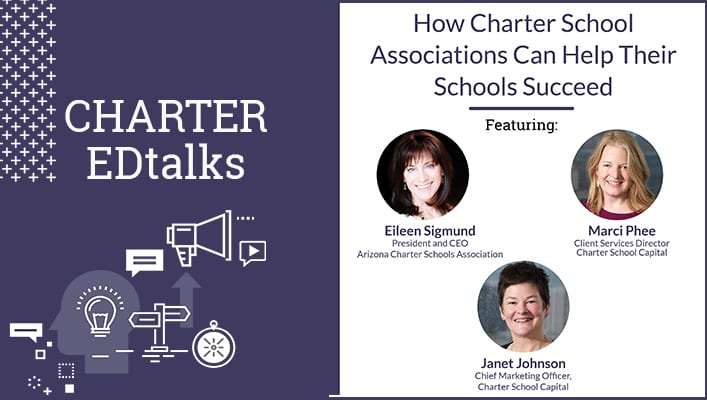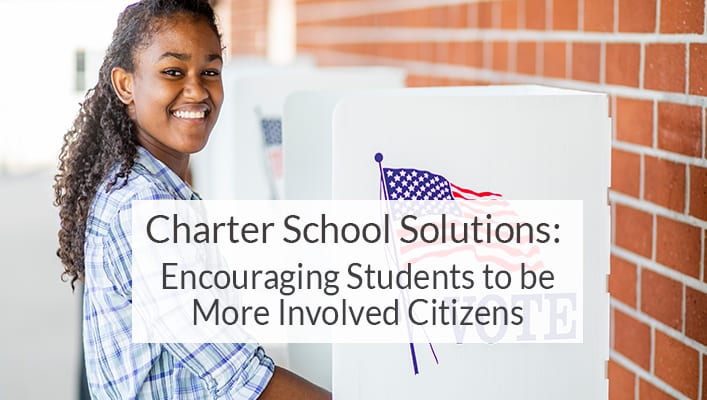 How Charter School Associations Can Help Their Schools Succeed
How Charter School Associations Can Help Their Schools Succeed
Editor’s Note: For this CHARTER EDtalk, we were honored to be joined by Eileen Sigmund, the President, and CEO of the Arizona Charter School Association as she generously shares some of the things the Arizona Charter School Association is doing to ensure the high-performance of Arizona charter schools. And, with 70 percent of their charter students sitting in A or B rated charter schools, compared to 56 percent of their district peers, they must be doing something right.
As the voice of Arizona’s charter schools, the Arizona Charter Schools Association engages a diverse coalition of policymakers, school leaders and community members for a fair, transparent policy landscape that allows quality charter schools to flourish throughout Arizona.
They work hard to advocate and strengthen the autonomy, equity, and quality of Arizona’s diverse public charter schools and are driven by the belief that all Arizona students should have access to a high-quality public school.
Watch the video below or read on to hear how the AZ Charter School Association is achieving such outstanding results.
Janet Johnson (JJ): Hi, I’m Janet Johnson from Charter School Capital and we’re here In Austin, Texas for the National Conference for Charter Schools. We are lucky to be here today with Eileen Sigmund who is President and CEO of the Arizona Charter School Association, and Marci Phee from Charter School Capital as well. And today we’re going to be talking a little bit with Eileen about academic performance. Thanks for joining us.
Eileen Sigmund (ES): Happy to be here.
Marci Phee (MP): Thank you. So we’re doing a campaign called “We Love Charter Schools”. Can you tell us in two sentences or less why you love charter schools?
ES: Charter schools meet the unique needs of our children so they can academically thrive and flourish.
JJ: Beautiful, you’ve done that a few times.
ES: I’m a charter school parent.
Measuring Growth Rather Than Just Performance
MP: The state of Arizona recently altered the rating system for charter schools to emphasize improvement and growth of the students rather than just strict performance. Can you discuss the benefits of measuring growth over performance?
ES: So the benefits of growth are really in the K-8 sector. In 9- 12, there’s also the completion of courses. So there are differences as you look at the academic performance for A-F measurement. The benefit of growth is not saying kids need to come to kindergarten already ready, already verbal, already knowing how to hold a pencil, because many of our kids don’t. And so what growth does is it allows to show educator impact on that individual student as compared to their academic peers. And so the growth is really showing how are you moving a child forward to proficiency who may not be at proficiency, who may not know two plus two equals four but is grasping that one, two, three, four. So it’s trying to value a child where they start, and then where they’re going, instead of how ready and prepared they are at a proficiency level. Does that make sense?
MP: It does make sense. It sounds like it allows educators to meet the students where they are and create progress. The progress over the perfection of things.
ES: Correct, correct. And we use in growth, we use the Colorado growth model. The growth model has been used in other states and actually, the Charter Association was part of the federal grant back in 2007, 2008, and the Charter Association was the main catalyst in getting the growth model to Arizona and that growth model has been used consistently for the last decade, the same growth model. So it’s also something educators are aware of, educators have learned. So it was used in our A -F back when we started in 2011.
Using Data to Coach Staff
MP: That’s helpful, thank you. How can charter schools better develop and support their teaching staff to support this model that you just talked about?
ES: Sure, teachers are no different than any other profession, that coaching continuously, constantly. The use of coaching and the use of data. So the use of data to know exactly where your students start, measure again halfway through the year, see their progress, measure again right before they take the state test. And so it’s the coaching around the use of data and then figuring out the academic strengths and weaknesses of each individual child.
Achievement with Accountability
MP: In Arizona, the majority of charter school students are sitting in “quality seats.” Can you tell us a little bit about what that means?
ES: The 2017 letter grades came out, 2018 will be out shortly. The students that were measured were our traditional students. We didn’t measure our alternative students, our online students, or our small schools. So 70 percent of our charter students are sitting in A or B rated charter schools.
JJ: Wow. That’s very impressive.
ES: Right, that’s compared to 56 percent of their district peers.
JJ: Can you say that again?
ES: So 70 percent of our charter students on the 2017 letter grades are sitting in A or B rated charter schools, compared to 56 percent of their district peers. And the reason for this is that our charter schools, the A through F is the reason they’ll keep their doors open. All F rated charter schools have signed agreements that either they’ll improve their academic rating over the next three years, or if they get another F in the next three years, they will be closed.
JJ: Wow, that’s commitment.
ES: Right. And so there were eight F rated charter schools. Three were already closing or are in the process of closing. Five signed a consent agreement. And some may have transferred or surrendered, but those are the ones, the eight is the number I’m consistently stuck on.
MP: Well, and from my experience with schools that have consent agreements in any state, typically I’ve noticed that if they’re going to sign it, they have approval from the board that they are committed to making those changes.
ES: Correct.
MP: I think that’s a great tool for driving improvement.
ES: Correct. And we have a manager of a separate affiliated partner, it’s called the Center for Student Achievement, an LLC under our charter school association, and we actively do professional development with our schools. And we’ve seen schools go from D to A. So there’s commitment and there’s the great leader, the great teachers and then this coaching to move things forward. We’ve seen this improvement. So all of our students benefit.
AZ Charters Outperforming Traditional District Schools
JJ: So the association is a very active, active body in development, professional development, et cetera, et cetera.
ES: And data. Yes, yes. So when I came onboard at the end of the legislative session in 2007, I had some experience with the charter sector, but I’m mainly a litigator, lobbyist, journalist and charters are created to provide student achievement and provide the communities a choice. Improving student achievement is where we’ve spent the last decade to make sure the quality is there for families because it’s our statutory mandate and then choice is also there in all the communities.
So, the charter sector in Arizona is in every one of our 30 legislative districts. If charters were their own state, they would outperform almost every other state except Massachusetts, and our charter sector is bigger than Delaware, Rhode Island. So we are large. And finally, if you look at eighth-grade math, based on the 2017 national report card, our charter students performed first in the country on math results for eighth grade and second in the country for reading results for eighth grade. So we have quite a bit of quality bragging rights.
And then for the last three years that we’ve had a new test, it’s called AZ Merit, our charter students have outperformed the state average in every grade, in every subject for the last three years. So our goal was the improve the quality, working collaboratively with our leaders and our authorizer, we have absolutely delivered on those results. So it is something that Arizona is very proud of.
MP: It should be.
ES: And our leaders are to be thanked because the work they’ve done has been extraordinary. Them and our teachers. It’s amazing.
An Active and Experienced Association is Key
MP: Well, I’ve noticed in my experience with your association, you’re very integrated with the schools and a part of the school and part of the movement, non-negotiable kind of feels like you’re just there. So my experience with other associations is that the membership school has to sort of reach up and self-serve the benefits that are part of their membership. But with the Arizona association, you really push them out and become partners with the schools and I just think that that’s a huge benefit and that other associations could probably model after that.
ES: Well, thank you. We have a team of 20 and we understand how busy our leaders are. They’re there to educate their students. Every Friday, we do a consistent email communication. It comes out at 6:30 in the morning. It’s a summary. Then, as different issues come up, we’ll bring in legal expertise, we’ll do webinars, we actively reach out to our schools based on their letter grades to make sure that they have the training they need, they can customize it, and we try to bring in experts on our team.
We had one of our charter leaders who won the MLK Award, she’s won different awards, she started or turned around three different high-poverty charter high schools and had outstanding academic results. We brought her on as our Director of Innovation. For operations, we had somebody who opened seven schools and so we brought him on our team. We brought on the former head of accountability for the Department of Ed. She’s our Chief Academic Officer.
We really try to bring the expertise and deliver that out to our schools and make them aware of the benefits. We have a 90 percent membership. Well, it’s probably about 88 percent, so it’s almost 90 percent. So we really try to work with our schools.
Now, we’re about to take things to the next level as we build up even stronger our communications around advocacy, as we move forward to the next election, the next session, because whether we like it or not, charter schools and choice has been under attack and even though there’s huge parent demand, we need to proactively get out the message about the benefits of parents being able to choose the right fit for their child. And so that’s going to be a campaign we’re moving forward.
We actively work with the National Alliance, other states, vice chair of the State Leaders Council. So my goal is to strengthen charter school organizations because we’re still a nascent industry and the miss and detractors are starting to increase. So you really need to get out that positive message and I think this conference and the work that Charter School Capital does really helps to get out that positive message.
On Working with Charter School Capital
MP: Can you share a little bit about your experience working with Charter School Capital?
ES: Yes. So I actively brought in Charter School Capital into Arizona. Charter School Capital fills a need that our schools wanted because obtaining financing is difficult. The public markets and bond markets or banking markets won’t always provide the financing our schools will need to get through a difficult situation. So for example, one of my schools, one of my great leaders in Tucson worked with Charter School Capital to buy their building. And it was a really positive experience for our school leader in Tucson.
But even prior to that, I worked with Stuart [Ellis], I had seen the need that was filled, and it’s a unique need and our schools definitely need to make sure they have all financial options because just as our students are unique, so are the school models for creating … We have 550 school models. And as we move forward, all the school leaders are in different places and Charter School Capital can meet the needs of those leaders.
MP: We’re very grateful for Arizona and being able to serve the leaders and the students there and partner with your association.
JJ: And we’re honored to have you here today. Thank you so much for spending time with us. We really appreciate it.
ES: Happy to do it.
Since the company’s inception in 2007, Charter School Capital has been committed to the success of charter schools. We provide growth capital and facilities financing to charter schools nationwide. Our depth of experience working with charter school leaders and our knowledge of how to address charter school financial and operational needs have allowed us to provide over $1.6 billion in support of 600 charter schools that educate 800,000 students across the country. For more information on how we can support your charter school, contact us. We’d love to work with you!












